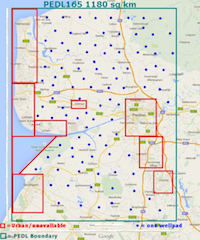This, sadly, is where the spin gets us
Yesterday in the debate on the Energy Bill few dared stand up for fracking, but one who did was South Suffolk Conservative MP James Cartlidge. He reasoned thus:
“The point is that some of the stuff we’re hearing coming out in the media warns of terrible things that could happen.
“I don’t see how a district council would ever approve fracking applications in the current climate and yet this industry potentially offers us so much potential, we at least have to give it a go.
“Indeed shale production could create up to 74,000 jobs, with many in areas of high unemployment.”
 Now we are not convinced by the argument that because “the media warns of terrible things that could happen” the best thing we can do is “give it a go” because that might prove them wrong. It is pretty clear that Mr Cartlidge isn’t living somewhere where the first attempts at “giving it a go” (Fylde and Yorkshire) are going to affect him personally.
Now we are not convinced by the argument that because “the media warns of terrible things that could happen” the best thing we can do is “give it a go” because that might prove them wrong. It is pretty clear that Mr Cartlidge isn’t living somewhere where the first attempts at “giving it a go” (Fylde and Yorkshire) are going to affect him personally.
What is more problematic though is his repetition of the discredited claim that “shale production could create up to 74,000 jobs”. When this claim was first made by Corin Taylor (then of the Institute of Directors, but now working a Head of Communications Planning and Research for Centrica ,who own a large part of Cuadrilla’s PEDL 165, and on secondment as a Director at United Kingdom Onshore Oil and Gas – UKOOG), we analysed his methodology and found it seriously wanting.
Over time, with other studies having indicated much smaller numbers (7,000, 15,900 – 24,300 etc) this ludicrous 74,000 claim has largely been retired, so it is disappointing to see Mr Cartlidge rattling this particular skeleton again.
What is clear though is that somebody who complains that there is “a lot of hysteria about a sector” really shouldn’t be repeating hysterical claims about its potential to create jobs, but that, sadly, is how the spin cycle works. If a “factoid” is repeated often enough plenty of people will believe it. In his own words “it can be very difficult to achieve a rational, objective decision” when members of parliament are bandying about numbers and claiming potential benefits which have absolutely no basis in reality.






























